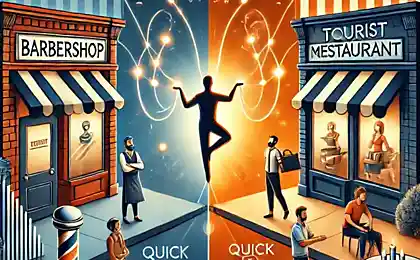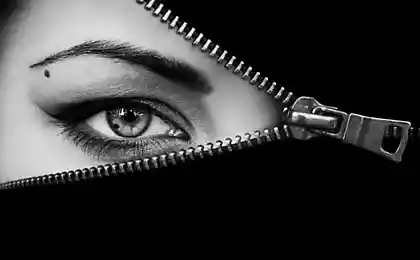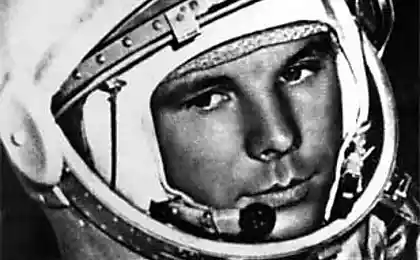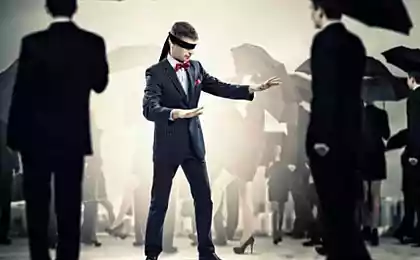557
What makes You buy something that you will never need
For anybody not a secret that the lion's share of the world economy thrives on human weaknesses. Vanity, position in society, the desire to insure from all sides, and even a passion for cream cheese - all this dictates their laws and forced to put your hard-earned money. Yes, you don't mind.
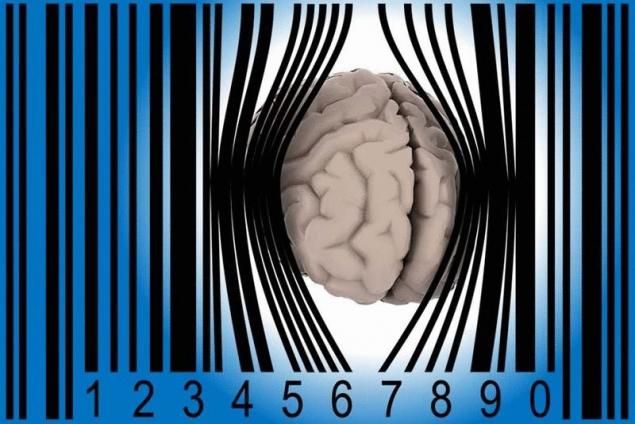
However, it is unlikely that many of you know, that one subject and another, much more strange laws. They take effect every time you cross the threshold of the store. And make you buy something you never need. You can about them and do not suspect, but people who want to sell something, for sure, very acquainted with them.
Act 1. You are predictable
You walk in the door of the nearest deli. Turn head to the right. What do you see? The network of shops Wal-Mart, Kroger, Whole Foods, and many others, this place is a division of fresh vegetables. Some stores parked next to another and pastries. And in all these stores the location of doors and Cass forces you to immediately turn right.
Scientists have spent more than a year analyzing our behavior while shopping, and came to the conclusion that we are as predictable as the animals during migration. It turned out that people like to get around the store counterclockwise. Consequently, business at the store will go better if you install the door on the right, and not in the middle or worse, left.
A modern supermarket is designed so that you can go around it in a certain, thoughtful, special people, route. Knowing that you will roll to the right, they place the most fresh and alluring goods where it first caught your eye. Not the way, mind you — they understand that you are unlikely to run to the store in the night for cabbage. They know that if this place would be a shelf of chips, you just grab the package and rush straight to the checkout. Instead, they lay there fresh vegetables that have the most chances to make a good impression on you. The trick is that the store now will automatically cause you to have associations with the fresh, pleasant smells and bright colors skillfully laid out vegetables.
"Oh, wow, after that fresh carrots products in this series really don't look so stale".
After they blinded you with bright lemons, apples and oranges, they lead you counter-clockwise so that certain products have appeared before you in the most suitable moment for them, that is when you are most likely ready to buy them.
What you really need is Cola, chips, milk, eggs, sliced cheese, will appear in front of you until the very end. By the time your truck will be filled with nonsense that you are passing through the automatic doors, not even thinking to buy it.
Remember! Their goal is to keep you in the store as long as possible, and to get you to circumvent as many of the racks. You will never buy "jalapeno pepper with honey" if you do not know about its existence.
Why it works:
We know that walking in a circle — the usual thing for a herd of animals, elephants, for example. But no you will not say exactly why the people behave the same way. Moreover, as studies have shown, buyers are England, Australia and Japan prefer to bypass the store in the opposite direction, i.e. clockwise.
The conclusion suggests itself that it has something to do with the decision taken in these countries drive on the left. Therefore, if you are used to driving on the right side of the road, in the store, you will inevitably pull to the right and then in a circle, along the wall.
Wild people!
Anyway, this impulse is really powerful. In one of the shops of Philadelphia tried, for the sake of experiment, to force buyers to enter the store on the left and work around clockwise. They opened the left entrance, and on the right, put some tables with the goods.
It was assumed that buyers will just shrug, turned to the left and continue your shopping, as if nothing had happened. There it was! They began to get to the right input, between the tables pushing their carts "with the tenacity of a salmon swimming against the current".
Act No. 2. Nothing brilliant, no stranger to
Answer without thinking: What is common between a new car ... and a diamond?
They both Shine and both are expensive. It is no coincidence, and sellers know it. It's almost a physical reaction — people automatically perceive all the brilliant thing as valuable and fashionable. Many even think that their car is better after the polishing is going. "This may not be the same clunker 1988, which I used to drive! Look how shiny!"
And why do you think, a good stores all so shiny?
Don't you want to lick every inch here?
Company Envirosell Inc., marketing consultant which has worked before in the U.S. post office, Wal-Mart, The Gap and many others, conducted their own study and found that pedestrians are involuntarily slow down the step in front of the glittering shop window. There's nothing we can do about it.
Why it works:
Well, first, we know that all sorts of shiny things like. We know, for example, many cases where birds steal jewelry.
In 1990, researchers have proposed an interesting theory explaining our love to Shine innate ability to find clean, drinkable water in the wild. In the past, when species had to worry about such things, this ability was great for us.
It was at that stage of evolution, when of necessity had to go into the bushes.
The researchers showed the participants four images of water and asked to choose the most attractive. Subjects, especially women, without hesitation pointed at the most brilliant picture, and insisted that depicted the water should be the best quality.
In the second part of the experiment, the researchers noticed that young children try to lick the mirror surface or pull over to face her. If they offer a choice between a regular white plate and shiny, the majority will choose brilliant and will try it on myself to clap. Lay a shiny plate on the floor, and the child falls on his haunches as though he were going to drink from the lake, and lick her center.
No one involved in the experiment children I've never done this with a white plate.
From all this, scientists deduced the theory that people at an early stage in its development possessed the ability to recognize shiny surfaces at large distances, which, in somewhat modified form, and handed down to us by inheritance. These genes and make you come in slight excitement at the sight of the light reflected from a smooth surface.
Law No. 3. Shopping gives you pleasure
This Christmas holiday, like all others, is not without big sales with the "removal of doors", which is the day after Thanksgiving suits most supermarkets. Hundreds of distraught people pillars in the wee hours not to buy something rare or even valuable, and, of course, not in order to buy a mountain of unnecessary things.
The buzz from the shopping — that's what it's done. And shops, taking advantage of our weakness, make the sales of slow moving product in real extreme with a powerful adrenaline rush.
We used to laugh at the fanatical superama or women, which can not live a day without buying a new pair of shoes, but let me ask you: you play video games? Now tell me, isn't in your collection there is no such that you never played?
Polls have shown that less than 10% of you games are kept, which were not even unpacked. There are even entire sites that help gamers to part with a mountain bought, but never found the use of toys.
Why? Yes, because gamers get more enjoyment not from the game itself, but from buying it.
And even more they love to discuss the games in the network.
Look around your house. How many of these DVDs do you look? And why do you need the 19th season of the Simpsons? Are you really going to sit down and watch all 110 discs, or you just want to buy them? For the sake of buying?
Why it works:
Dopamine. Good old dopamine. Is a substance that your brain produces when you're in love, take psychoactive drugs or eat delicious food. Dopamine influences all functions related to behavior, cognition, movement and other important things, such as the ability to retain saliva in your mouth and breast feeding. Could not to mention breast-feeding.
And more importantly, dopamine is the gatekeeper to your emotions, both positive and negative, which means that it allows you to open, explore and achieve something new.
Moreover, its effect is amplified when we enter a new store, or arrive in a new city. Studies have shown that we often make expensive and pointless purchases while traveling. And, of course, not for the sake of this unnecessary and expensive things, but for dopamine, all of the same powerful dopamine...
...also known as "the only thing that makes life more bearable"
However, one way to beat the system is still there. The fact that it is a pleasure not by purchase, and her anticipation (though just do some window-shopping is still not enough). It only remains to find a way to enjoy the pleasure of anticipation, nothing buying.
Law No. 4. Numbers not your strong point
After Steve jobs introduced the world to your iPad, all the talk about the new miracle of technology revolved primarily around its unexpectedly low price. Just $ 499! It's a good price for ...
Brilliant...
... wait for what? This thing is until that day never sold. It is more than a phone and more expensive than netbook. So why we decided that $ 499 is a good price?
And yet, why do stores continue to draw the endless nines on the price tags? Even turning to the crowd of sensible people with higher education, they still offer us to buy something for $ 499 instead say, "it's worth five hundred bucks." As if taking us for idiots, unable to count, 499 less than 500 total per unit? We already saw through this trick, isn't it?
Not a fact.
In fact, people are not good with numbers, than stores without a twinge of conscience and enjoy. First, you wait patiently when you liked the sweater will appear on sale to save 10% of the price, then pay for it with a credit card, which charges a percentage. As a result, the sweater is costing you more than their original price.
We are offended relatively low monthly payments and take the loan in the long term. We can't figure out that increasing the term of the loan, we agree to pay for the same house for $ 50,000 more.
By the time when you become the owner of this house, he will need a major overhaul.
Sellers know that it depends on them the real price of your home. In business, the price is called "anchor". Suppose you go to an appliance store and see a new TV that's 25% cheaper than its "regular price" or the prices "recommended by manufacturer". Then you Google and find out what rates are presented as "normal" does not exist in nature. You will save 25 percent of the amount taken from the ceiling.
How to be mellifluous price of $ 499 for an iPad? Its appeal it is obliged skillfully conducted promotional campaign. Long before the advent of new sources such as Apple Insider, for example, diligently tried to convince us that the iPad will cost no less than a thousand. Then, presenting his new creation, jobs did not fail once again to remind about it. They drove that thousand bucks into our heads, so the amount of $ 499 seemed trifling.
Why it works:
Imagine three Golf ball lying in a row.
Now imagine a box, which is a 4 258 such goals.
I bet you won't be able to imagine how to look 4 258 balls at once, you will not be able to estimate the size of the box in which they could fit. Our brains are simply not equipped to cope with such numbers. From the point of view of evolution it is not surprising — the complex number system was invented not earlier than 5 thousand years ago. In addition, natural selection did not take into account the mathematical ability.
The story of the 499 $ 500 – perfect proof. Even if the mind you realize that there is no fundamental difference between these numbers is not, your mind still registers this difference as significant.
Your brain is not very well matches the figures with the number of something that exists in the real world. This is because you read the prices, like everything else, from left to right. You unwittingly give more importance to the first that you see. You may convince yourself otherwise, but your brain still registers $ 499 more as a "400" instead of "almost 500".
Or "enough ramen noodles to finish the magistracy."
The same studies have shown that the harder we try to control their expenses, the worse it turns out. Buyers who try to calculate every penny, loading goods to his cart, the result is wrong by about 20%. Why? Because of the notorious .99 making an accurate count almost impossible. Please reply quickly, as are three Beers for $ 2 each? Surely you just found the right answer. And three cans for 1.99? Most of you will need a pen and paper.
Strange, but those buyers who were not so scrupulous calculations, determined the total amount of your check is much more accurate. They were just rounded up and put prices, instead of trying to get the exact amount and make mistakes. Although the development of mathematical abilities, these exercises can be very useful.
Long live ignorance!
Law No. 5. Your taste easy to cheat with a familiar logo
Confidence in the brand is justified, but only to some extent. If you like your last Toyota, it's the perfect excuse to buy a new car of the same brand. Even Apple fans weren't always like this. They once bought any product of this company and he, apparently, liked them.
There comes, however, when brand name begins to play with you a malicious joke. You begin to overestimate the pleasure that the famous brand product in the condition you deliver. Immediately say, that does not mean obsessed with the brand of the ladies of the "Sex and the city", constantly twittering about Gucci shoes and Prada handbag. For them, the fashion brand is necessary as a sign of belonging to the higher strata of society.
No, I'm on the other:
In 1970, the company Pepsi has built a whole advertising campaign around the experiment called "Pepsi challenge". They poured Pepsi and Coke in the same cups and asked people to choose the soda, which they like best.
Most Americans chose Pepsi. The promotion ended a resounding success, and cases of Coca-Cola went downhill, she drowned in sugar syrup and since then it nobody else heard...
At least that's supposed to happen. Instead, Coca-Cola and to this day are sold worldwide better than Pepsi. This is despite the fact that people still recognize that Pepsi tastes better.
The icon of the participant of the experiment says: "I chose Coca-Cola"
Worse, in tests, when trademarks drinks were opened, the results were the opposite: seeing the familiar logo in red Bank, people preferred Coca-Cola. This phenomenon is known as "the Pepsi Paradox".
A similar thing happened when people were asked to try wine of different prices. Wine for $ 90 people rated as significantly higher quality than exactly the same, but with a price tag of $ 10. In China there is a very expensive beer ($44 a bottle) that's very similar to cheap American swill Pabst Blue Ribbon. Enterprising Chinese just stuck a Golden label and inflated price. And the Chinese pay it, because the label changes the flavor.
Right thing to submit.
Why it works:
All the matter in the two hemispheres of the brain, one of which is responsible for feelings (including taste) and the other for thinking and classification (i.e. determines your choice based on experience and knowledge). The second may override the first, if the brand or logo associated quite pleasant associations.
Scientists made this conclusion when he repeated the experiment with Pepsi and Coke simultaneously scanning the brains of volunteers using the imager.
The "blind" test showed that Pepsi to a greater extent than Coca-Cola stimulates the part of the brain responsible for pleasure. However, when the experiment participants were offered a drink off-the logos, suddenly activated brain areas relevant to the analysis.
"Coke it's delicious and you love it" — subconscious telling you what I had to learn over the years of the campaign. And sensual perception goes by the wayside. So they really can wash your brain and make you love anything.
Fortunately science has gone further and found a solution. According to another study, those people who have areas of the brain responsible for emotions, was damaged, he lost all respect for the brand and chose Pepsi even open label.
source: mixednews.ru
Source: /users/1077

However, it is unlikely that many of you know, that one subject and another, much more strange laws. They take effect every time you cross the threshold of the store. And make you buy something you never need. You can about them and do not suspect, but people who want to sell something, for sure, very acquainted with them.
Act 1. You are predictable
You walk in the door of the nearest deli. Turn head to the right. What do you see? The network of shops Wal-Mart, Kroger, Whole Foods, and many others, this place is a division of fresh vegetables. Some stores parked next to another and pastries. And in all these stores the location of doors and Cass forces you to immediately turn right.
Scientists have spent more than a year analyzing our behavior while shopping, and came to the conclusion that we are as predictable as the animals during migration. It turned out that people like to get around the store counterclockwise. Consequently, business at the store will go better if you install the door on the right, and not in the middle or worse, left.
A modern supermarket is designed so that you can go around it in a certain, thoughtful, special people, route. Knowing that you will roll to the right, they place the most fresh and alluring goods where it first caught your eye. Not the way, mind you — they understand that you are unlikely to run to the store in the night for cabbage. They know that if this place would be a shelf of chips, you just grab the package and rush straight to the checkout. Instead, they lay there fresh vegetables that have the most chances to make a good impression on you. The trick is that the store now will automatically cause you to have associations with the fresh, pleasant smells and bright colors skillfully laid out vegetables.
"Oh, wow, after that fresh carrots products in this series really don't look so stale".
After they blinded you with bright lemons, apples and oranges, they lead you counter-clockwise so that certain products have appeared before you in the most suitable moment for them, that is when you are most likely ready to buy them.
What you really need is Cola, chips, milk, eggs, sliced cheese, will appear in front of you until the very end. By the time your truck will be filled with nonsense that you are passing through the automatic doors, not even thinking to buy it.
Remember! Their goal is to keep you in the store as long as possible, and to get you to circumvent as many of the racks. You will never buy "jalapeno pepper with honey" if you do not know about its existence.
Why it works:
We know that walking in a circle — the usual thing for a herd of animals, elephants, for example. But no you will not say exactly why the people behave the same way. Moreover, as studies have shown, buyers are England, Australia and Japan prefer to bypass the store in the opposite direction, i.e. clockwise.
The conclusion suggests itself that it has something to do with the decision taken in these countries drive on the left. Therefore, if you are used to driving on the right side of the road, in the store, you will inevitably pull to the right and then in a circle, along the wall.
Wild people!
Anyway, this impulse is really powerful. In one of the shops of Philadelphia tried, for the sake of experiment, to force buyers to enter the store on the left and work around clockwise. They opened the left entrance, and on the right, put some tables with the goods.
It was assumed that buyers will just shrug, turned to the left and continue your shopping, as if nothing had happened. There it was! They began to get to the right input, between the tables pushing their carts "with the tenacity of a salmon swimming against the current".
Act No. 2. Nothing brilliant, no stranger to
Answer without thinking: What is common between a new car ... and a diamond?
They both Shine and both are expensive. It is no coincidence, and sellers know it. It's almost a physical reaction — people automatically perceive all the brilliant thing as valuable and fashionable. Many even think that their car is better after the polishing is going. "This may not be the same clunker 1988, which I used to drive! Look how shiny!"
And why do you think, a good stores all so shiny?
Don't you want to lick every inch here?
Company Envirosell Inc., marketing consultant which has worked before in the U.S. post office, Wal-Mart, The Gap and many others, conducted their own study and found that pedestrians are involuntarily slow down the step in front of the glittering shop window. There's nothing we can do about it.
Why it works:
Well, first, we know that all sorts of shiny things like. We know, for example, many cases where birds steal jewelry.
In 1990, researchers have proposed an interesting theory explaining our love to Shine innate ability to find clean, drinkable water in the wild. In the past, when species had to worry about such things, this ability was great for us.
It was at that stage of evolution, when of necessity had to go into the bushes.
The researchers showed the participants four images of water and asked to choose the most attractive. Subjects, especially women, without hesitation pointed at the most brilliant picture, and insisted that depicted the water should be the best quality.
In the second part of the experiment, the researchers noticed that young children try to lick the mirror surface or pull over to face her. If they offer a choice between a regular white plate and shiny, the majority will choose brilliant and will try it on myself to clap. Lay a shiny plate on the floor, and the child falls on his haunches as though he were going to drink from the lake, and lick her center.
No one involved in the experiment children I've never done this with a white plate.
From all this, scientists deduced the theory that people at an early stage in its development possessed the ability to recognize shiny surfaces at large distances, which, in somewhat modified form, and handed down to us by inheritance. These genes and make you come in slight excitement at the sight of the light reflected from a smooth surface.
Law No. 3. Shopping gives you pleasure
This Christmas holiday, like all others, is not without big sales with the "removal of doors", which is the day after Thanksgiving suits most supermarkets. Hundreds of distraught people pillars in the wee hours not to buy something rare or even valuable, and, of course, not in order to buy a mountain of unnecessary things.
The buzz from the shopping — that's what it's done. And shops, taking advantage of our weakness, make the sales of slow moving product in real extreme with a powerful adrenaline rush.
We used to laugh at the fanatical superama or women, which can not live a day without buying a new pair of shoes, but let me ask you: you play video games? Now tell me, isn't in your collection there is no such that you never played?
Polls have shown that less than 10% of you games are kept, which were not even unpacked. There are even entire sites that help gamers to part with a mountain bought, but never found the use of toys.
Why? Yes, because gamers get more enjoyment not from the game itself, but from buying it.
And even more they love to discuss the games in the network.
Look around your house. How many of these DVDs do you look? And why do you need the 19th season of the Simpsons? Are you really going to sit down and watch all 110 discs, or you just want to buy them? For the sake of buying?
Why it works:
Dopamine. Good old dopamine. Is a substance that your brain produces when you're in love, take psychoactive drugs or eat delicious food. Dopamine influences all functions related to behavior, cognition, movement and other important things, such as the ability to retain saliva in your mouth and breast feeding. Could not to mention breast-feeding.
And more importantly, dopamine is the gatekeeper to your emotions, both positive and negative, which means that it allows you to open, explore and achieve something new.
Moreover, its effect is amplified when we enter a new store, or arrive in a new city. Studies have shown that we often make expensive and pointless purchases while traveling. And, of course, not for the sake of this unnecessary and expensive things, but for dopamine, all of the same powerful dopamine...
...also known as "the only thing that makes life more bearable"
However, one way to beat the system is still there. The fact that it is a pleasure not by purchase, and her anticipation (though just do some window-shopping is still not enough). It only remains to find a way to enjoy the pleasure of anticipation, nothing buying.
Law No. 4. Numbers not your strong point
After Steve jobs introduced the world to your iPad, all the talk about the new miracle of technology revolved primarily around its unexpectedly low price. Just $ 499! It's a good price for ...
Brilliant...
... wait for what? This thing is until that day never sold. It is more than a phone and more expensive than netbook. So why we decided that $ 499 is a good price?
And yet, why do stores continue to draw the endless nines on the price tags? Even turning to the crowd of sensible people with higher education, they still offer us to buy something for $ 499 instead say, "it's worth five hundred bucks." As if taking us for idiots, unable to count, 499 less than 500 total per unit? We already saw through this trick, isn't it?
Not a fact.
In fact, people are not good with numbers, than stores without a twinge of conscience and enjoy. First, you wait patiently when you liked the sweater will appear on sale to save 10% of the price, then pay for it with a credit card, which charges a percentage. As a result, the sweater is costing you more than their original price.
We are offended relatively low monthly payments and take the loan in the long term. We can't figure out that increasing the term of the loan, we agree to pay for the same house for $ 50,000 more.
By the time when you become the owner of this house, he will need a major overhaul.
Sellers know that it depends on them the real price of your home. In business, the price is called "anchor". Suppose you go to an appliance store and see a new TV that's 25% cheaper than its "regular price" or the prices "recommended by manufacturer". Then you Google and find out what rates are presented as "normal" does not exist in nature. You will save 25 percent of the amount taken from the ceiling.
How to be mellifluous price of $ 499 for an iPad? Its appeal it is obliged skillfully conducted promotional campaign. Long before the advent of new sources such as Apple Insider, for example, diligently tried to convince us that the iPad will cost no less than a thousand. Then, presenting his new creation, jobs did not fail once again to remind about it. They drove that thousand bucks into our heads, so the amount of $ 499 seemed trifling.
Why it works:
Imagine three Golf ball lying in a row.
Now imagine a box, which is a 4 258 such goals.
I bet you won't be able to imagine how to look 4 258 balls at once, you will not be able to estimate the size of the box in which they could fit. Our brains are simply not equipped to cope with such numbers. From the point of view of evolution it is not surprising — the complex number system was invented not earlier than 5 thousand years ago. In addition, natural selection did not take into account the mathematical ability.
The story of the 499 $ 500 – perfect proof. Even if the mind you realize that there is no fundamental difference between these numbers is not, your mind still registers this difference as significant.
Your brain is not very well matches the figures with the number of something that exists in the real world. This is because you read the prices, like everything else, from left to right. You unwittingly give more importance to the first that you see. You may convince yourself otherwise, but your brain still registers $ 499 more as a "400" instead of "almost 500".
Or "enough ramen noodles to finish the magistracy."
The same studies have shown that the harder we try to control their expenses, the worse it turns out. Buyers who try to calculate every penny, loading goods to his cart, the result is wrong by about 20%. Why? Because of the notorious .99 making an accurate count almost impossible. Please reply quickly, as are three Beers for $ 2 each? Surely you just found the right answer. And three cans for 1.99? Most of you will need a pen and paper.
Strange, but those buyers who were not so scrupulous calculations, determined the total amount of your check is much more accurate. They were just rounded up and put prices, instead of trying to get the exact amount and make mistakes. Although the development of mathematical abilities, these exercises can be very useful.
Long live ignorance!
Law No. 5. Your taste easy to cheat with a familiar logo
Confidence in the brand is justified, but only to some extent. If you like your last Toyota, it's the perfect excuse to buy a new car of the same brand. Even Apple fans weren't always like this. They once bought any product of this company and he, apparently, liked them.
There comes, however, when brand name begins to play with you a malicious joke. You begin to overestimate the pleasure that the famous brand product in the condition you deliver. Immediately say, that does not mean obsessed with the brand of the ladies of the "Sex and the city", constantly twittering about Gucci shoes and Prada handbag. For them, the fashion brand is necessary as a sign of belonging to the higher strata of society.
No, I'm on the other:
In 1970, the company Pepsi has built a whole advertising campaign around the experiment called "Pepsi challenge". They poured Pepsi and Coke in the same cups and asked people to choose the soda, which they like best.
Most Americans chose Pepsi. The promotion ended a resounding success, and cases of Coca-Cola went downhill, she drowned in sugar syrup and since then it nobody else heard...
At least that's supposed to happen. Instead, Coca-Cola and to this day are sold worldwide better than Pepsi. This is despite the fact that people still recognize that Pepsi tastes better.
The icon of the participant of the experiment says: "I chose Coca-Cola"
Worse, in tests, when trademarks drinks were opened, the results were the opposite: seeing the familiar logo in red Bank, people preferred Coca-Cola. This phenomenon is known as "the Pepsi Paradox".
A similar thing happened when people were asked to try wine of different prices. Wine for $ 90 people rated as significantly higher quality than exactly the same, but with a price tag of $ 10. In China there is a very expensive beer ($44 a bottle) that's very similar to cheap American swill Pabst Blue Ribbon. Enterprising Chinese just stuck a Golden label and inflated price. And the Chinese pay it, because the label changes the flavor.
Right thing to submit.
Why it works:
All the matter in the two hemispheres of the brain, one of which is responsible for feelings (including taste) and the other for thinking and classification (i.e. determines your choice based on experience and knowledge). The second may override the first, if the brand or logo associated quite pleasant associations.
Scientists made this conclusion when he repeated the experiment with Pepsi and Coke simultaneously scanning the brains of volunteers using the imager.
The "blind" test showed that Pepsi to a greater extent than Coca-Cola stimulates the part of the brain responsible for pleasure. However, when the experiment participants were offered a drink off-the logos, suddenly activated brain areas relevant to the analysis.
"Coke it's delicious and you love it" — subconscious telling you what I had to learn over the years of the campaign. And sensual perception goes by the wayside. So they really can wash your brain and make you love anything.
Fortunately science has gone further and found a solution. According to another study, those people who have areas of the brain responsible for emotions, was damaged, he lost all respect for the brand and chose Pepsi even open label.
source: mixednews.ru
Source: /users/1077



